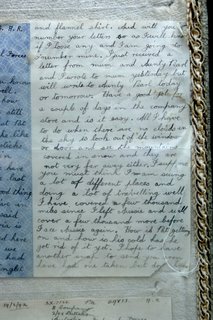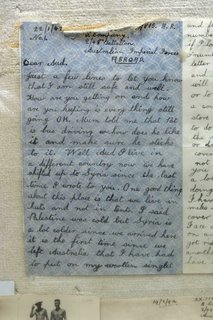

Military Museums,
Learning the lesson from history
What happens to me, and what do I think of, when I visit military museums?! A lot I should say. Last month I visited the military museum of Al-Alamain, and last weekend I visited Port Said’s one.
All those complex weapons, knifes, guns, uniforms. All those broken forks, spoons, and rusty water bottles. All those half-crashed tools and dishes. All this toil that shows on the soldiers’ faces. All those looks of fear. All those coffins in the pictures and displayed in the showroom. All those glittering medals worn by Generals riding on the backs of lively Arabian horses. What is all that? And for what?
Those are two letters by an Australian soldier in World War II writing to his sister. He starts the first letter by clearly stating that those are just few lines to say that he’s fine. Yet, he gives half the first page to asking and talking about the family, and starts talking about his news only in the second part. It’s as if he’s talking to them and about them just to feel that he still belongs to them; asking questions and giving advice – a clear sign of loneliness.
The only thing he mentions about the countries he’s moving to and from is the weather; specifically the coldness of the weather. Isn’t this strange? This person is from Australia not from South Africa. A man from the West is describing the weather of the East as cold?!! And not only that, but also defining the differences between the countries only through the degree of coldness. Among all the things one can see while staying in a foreign country, this soldier describes nothing and sees nothing but the cold weather, and the best thing that happened to him is that although he moved from the cold Palestine to the even colder Syria, he lives now in a hut not a tent. Away from home, he’s just moving from a cold place to a colder one, and when he writes to his family to say “I’m fine”, he just says I’m living in a cold world.
He talks about the heavier clothes he’s putting on, to defend himself from the cold weather. He tells his sister to number the letters so that he would know if he loses any. He talks about his mother’s and his aunt’s letters, and mentions one sentence about a job he has, then what? He goes back to talking about the cold weather. When there are no clouds, he looks out of the window just to see the mountains covered with snow. He says that he covered thousands of miles since he had left home, and will cover more before he goes back home. Then, he remembers a family member only to ask about his cold fit.
What’s all this talk about the weather? The bad weather. The cold, cloudy, snowy weather. This thought is interrupted only to talk about a way to avoid losing letters. What’s all this sense of loss, loneliness, and home sickness? This is not a person who is creating a glorious history for his nation. This is a person who is very defeated inwardly. What more he could have said to tell his leaders that wars are lost cases. Those humans; their feelings, their lives, and their stories are the price readily paid by nations for history to win power. And history keeps repeating itself and nobody is learning the lesson.


ليست هناك تعليقات:
إرسال تعليق